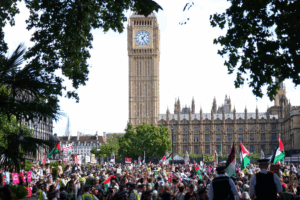Britain’s recognition of Palestine is pathetically little and a century late

Pro-Palestine demonstrators outside the Houses of Parliament highlight ongoing calls for Britain to recognise Palestinian statehood
Avi Shlaim writes in TRT World on 21 September 2025:
In a historic shift, Britain has officially recognised the state of Palestine, a century after the Balfour Declaration set the course for its dispossession.
Prime Minister Sir Keir Starmer first announced in July that the UK would take this step at the UN General Assembly’s annual meeting in September unless Israel met certain conditions, including agreeing to a ceasefire in Gaza, lifting the ban on humanitarian aid, and reviving the prospect of a two-state solution.
Prime Minister Benjamin Netanyahu reacted furiously to the announcement, saying the decision rewarded “Hamas’s monstrous terrorism”. His Foreign Minister, Gideon Saar, threatened “a unilateral decision”, like formally annexing the occupied West Bank, if British and European recognition of Palestine were to go ahead.
At this historical juncture, Britain’s recognition of Palestine as a state is pathetically little, and a century too late.
In 1917, Britain, in the infamous Balfour Declaration, pledged its support for the establishment of a “national home” – that is, a state – for the Jewish people in Palestine. At the time, the Jews made up just 10 percent of the population of Palestine, and they owned only two percent of the land. Yet, in British eyes, the 10 percent merited the right to self-determination, whereas the 90 percent did not.
To add insult to injury, the Balfour Declaration referred to the Palestinian majority as “the non-Jewish communities in Palestine”, thereby negating their existence by defining them in terms of what they were not. As Edward Said pointed out, it was a classic colonial document. From 1922 until 1948, Britain ruled Palestine under a League of Nations Mandate, said to be a “sacred trust of civilisation”, to prepare the country for self-government as per their duty under the Mandate.
Instead, Britain betrayed this trust by preparing the country to be taken over by European Jews. The history of the British Mandate in Palestine is essentially the story of how Britain stole Palestine from the Palestinians and handed it over to the Zionists.
The cornerstone of the Mandate was to prevent elections until the Jews became the majority. Britain enabled the tiny Jewish population to embark on the systematic takeover of the whole country, a process that continues to this day. It also thwarted the peaceful coexistence of Jews, Muslims, and Christians that prevailed in Palestine before the imposition of British colonial rule.
Britain abused the Mandate to sponsor and promote Zionist settler-colonialism on the one hand while suppressing Palestinian nationalism on the other. In this sense, the current Israeli incursion into Gaza is a direct consequence of the Balfour Declaration, which mandated unbridled Zionist takeover of the whole land of Palestine.
This is why Britain’s decision to recognise Palestine today, while carrying historical weight, rings hollow unless it is matched by meaningful action to undo the damage of a century of complicity.
From hollow gestures to present-day complicity
Since 1948, under both Conservative and Labour governments, British policy has been marked by conspicuous support for Israel and total indifference to Palestinian rights, most notably the natural right of the majority to national self-determination.
In 2014, the House of Commons passed a motion for recognising Palestine as a state, supported by 274 MPs with 12 voting against. The vote was a clear reflection of the views and sentiments of Britain as a whole. Then-prime minister David Cameron, however, dismissed the result as just a symbolic and non-binding gesture that would not affect in any way the foreign policy of his government.
In 2017, on the centenary of the Balfour Declaration, 13,500 people signed a petition calling on the British government to issue an apology for the Balfour Declaration. Then-premier Theresa May replied that the government had nothing to apologise for; on the contrary, it was proud of the vital role that Britain had played in creating a state for the Jewish people in their ancestral homeland. There was no mention of the Palestinians or of their right to their homeland.
After 1967, a deep contradiction marked British policy on Israel/Palestine. Britain ostensibly supported a two-state solution to the conflict, that is to say, an independent Palestinian state alongside Israel, consisting of Gaza and the occupied West Bank, with a capital city in East Jerusalem.
But while advocating a two-state solution, Britain recognised only one state – Israel –ignoring Israel’s consistent rejection of a Palestinian state. The prospect of a hazy two-state solution remains a convenient but hypocritical cloak for failing to act against creeping Israeli annexation of the occupied territories.
The debate about recognising Palestine was reignited by Israel’s genocidal war on Gaza following the Hamas cross-border blitz of October 7, 2023.
Since that day, the Israeli military have rained death and destruction on the tiny enclave: killing over 64,000 people (mostly women and children); bombing 89 percent of the houses and civilian infrastructure; seriously damaging the healthcare facilities; targeting schools and universities and UN facilities; forcibly displacing 90 percent of the civilian population, in some cases upward of ten times; and using starvation as a weapon of war.
In the course of waging this savage war – ‘Operation A Thousand Swords’, to give it its official name – Israel is also committing the crime of all crimes: genocide.
The Israeli genocide in Gaza is the darkest chapter in the history of the twenty-first century. Despite the horrors that are unfolding daily in front of our eyes, British policy continues to lean strongly in favour of Israel, providing the offender with diplomatic, logistical, intelligence, and military support.
